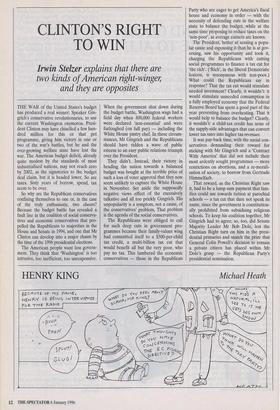CLINTON'S RIGHT TO WIN
Irwin Stelzer explains that there are
two kinds of American right-winger, and they are opposites
THE WAR of the United States's budget has produced a real winner: Speaker Gin- grich's conservative revolutionaries, to use the current Washington oxymoron. Presi- dent Clinton may have chiselled a few hun- dred million for this or that pet programme, giving him victory in one or two of the war's battles, but he and the ever-growing welfare state have lost the war. The American budget deficit, already quite modest by the standards of most industrialised nations, may not reach zero by 2002, as the signatories to the budget deal claim, but it is headed lower. So are taxes. Sixty years of borrow, spend, tax seem to be over.
So why are the Republican conservatives confining themselves to one or, in the case of the truly enthusiastic, two cheers? Because the budget battle has revealed a fault line in the coalition of social conserva- tives and economic conservatives that pro- pelled the Republicans to majorities in the House and Senate in 1994, and one that Mr Clinton can develop into a major chasm by the time of the 1996 presidential elections.
The American people want less govern- ment. They think that 'Washington' is too intrusive, too inefficient, too unresponsive. When the government shut down during the budget battle, Washington wags had a field day when 800,000 federal workers were declared `non-essential' and were furloughed (on full pay) — including the White House pastry chef. In these circum- stances, Mr Gingrich and the Republicans should have ridden a wave of public esteem to an easy public relations triumph over the President.
They didn't. Instead, their victory in heading the nation towards a balanced budget was bought at the terrible price of such a loss of voter approval that they now seem unlikely to capture the White House in November. Set aside the supposedly negative views effect of the excessively talkative and all too prickly Gingrich. His unpopularity is a symptom, not a cause, of the conservatives' problem, That problem is the agenda of the social conservatives.
The Republicans were obliged to call for such deep cuts in government pro- grammes because their family-values wing had committed itself to a $500-per-child tax credit, a multi-billion tax cut that would benefit all but the very poor, who pay no tax. This lumbered the economic conservatives — those in the Republican Party who are eager to get America's fiscal house and economy in order — with the necessity of defending cuts in the welfare state to balance the budget, while at the same time proposing to reduce taxes on the `non-poor', as average earners are known.
The President, better at sensing a popu- lar cause and espousing it than he is at gov- erning, saw his opportunity and took it, charging the Republicans with cutting social programmes to finance a tax cut for `the rich'. (`Rich', in the liberal Democratic lexicon, is synonymous with non-poor.) What could the Republicans say in response? That the tax cut would stimulate needed investment? Clearly, it wouldn't: it would stimulate unneeded consumption in a fully employed economy that the Federal Reserve Board has spent a good part of the year preventing from overheating. That it would help to balance the budget? Clearly, it wouldn't: a child-tax credit has none of the supply-side advantages that can convert lower tax rates into higher tax revenues.
It was pay-back time, with the social con- servatives demanding their reward for sticking with Mr Gingrich and a 'Contract With America' that did not include their most ardently sought programmes — more restrictions on abortions, and a re-morali- sation of society, to borrow from Gertrude Himmelfarb.
That reward, as the Christian Right saw it, had to be a lump sum payment that fam- ilies could use towards tuition at parochial schools — a tax cut that dare not speak its name, since the goverhment is constitution- ally prohibited from subsidising religious schools. To keep his coalition together, Mr Gingrich had to agree; so, too, did Senate Majority Leader Mr Bob Dole, lest the Christian Right turn on him in the presi- dential primaries and snatch the prize that General Colin Powell's decision to remain a private citizen has placed within Mr Dole's grasp — the Republican Party's presidential nomination. But serious conservatives in Washin are now saying that anyone who think that value-driven social conservatives can live happily ever after with market-driven economic conservatives had better think again. For free markets will inevitably pro- duce results that conflict with one or another of the deeply held values of the social conservatives. Nothing personal: the freely operating, competitive markets sooner or later impinge on some group's values. When the market produces more automobiles and fewer rapid transit sys- tems, it conflicts with the values of envi- ronmentalists. When the market brings more modern violence and less Shake- spearean slaughter to the television screen, it conflicts with the values of the intellectu- al elite. It is this conflict between markets and the ideals of various groups that prompts those groups to seek control of the levers of governmental power so that they may substitute their deeply held val- ues for market results.
That is why it will be impossible for true economic conservatives ever to buy into the agenda of the social conservatives: the former favour the process of free choice, whatever its results; the latter, on the other hand, favour a set of results, or values, even if those must be imposed on dis- senters. In this sense, social conservatives differ from 'liberals' (again, in the Ameri- can sense of the word) only in the specific values they would impose. Social conserva- tives abhor abortions and would therefore make them illegal for everyone; social lib- erals favour what they call 'choice', but are not content to leave it at that — they would conscript tax money from those who oppose abortion to fund the procedure for those who choose it. Both would use gov- ernment compulsion to impose their views on dissenters. Social conservatives see a link between the violence shown on televi- sion and the violence in our streets, and therefore would have government, in neo- conservative guru Irving Kristol's beguil- ingly soothing words, 'step in to help the parents' by imposing censorship. Liberals see a link between cigarette-smoking and ill health, and would have government intervene to clear the air. Neither group would allow informed adults free access to the sin of their choice.
Can economic conservatives, who want less government, bed down comfortably with social conservatives with their vision of an activist, intrusive government? Not for long. Soon that master seducer, Mr Clinton, a born-again New Democrat and professed believer in smaller government, will be whis- pering sweetly into the ears of those who want less government that the budget agree- ment he signed promises just that. He will say it is the family values, anti-abortion, pro- censorship conservatives that now threaten more intrusion by government into our lives. He will invite the economic conservatives into his bed. Not too many have resisted his blandishments in the past.



















































 Previous page
Previous page